Five social media trends after Brexit vote
- Published
The UK has voted to leave the European Union prompting many social media users to take to their keyboards to post their reaction. We've rounded up some of the most popular post-Brexit trends.
1. A call for London's independence
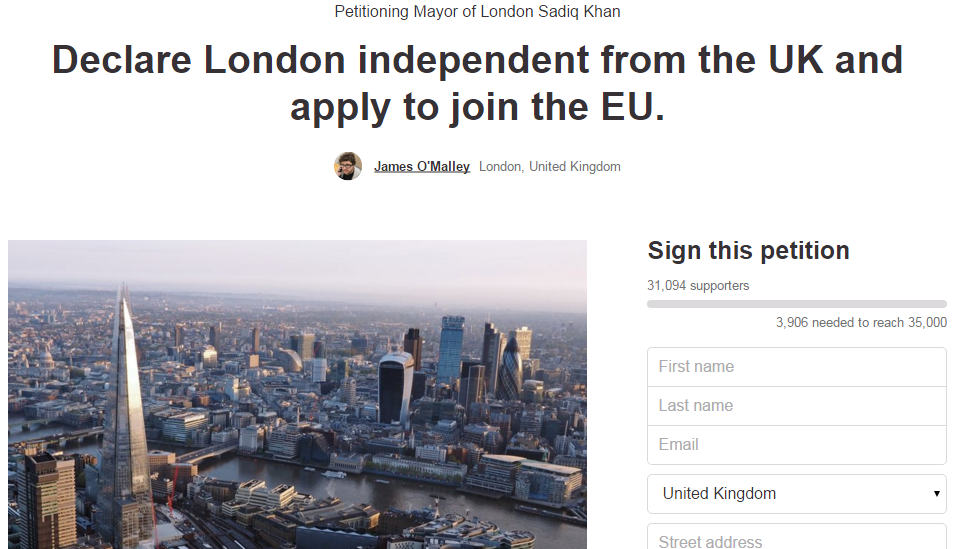
Almost all the major parts of the UK had a majority of votes to leave the EU, but three voted in favour of Remain: Scotland, Northern Ireland and London.
The Scottish National Party leader Nicola Sturgeon has declared that a second independence referendum is "highly likely". And Northern Ireland's deputy first minister, Sinn Fein's Martin McGuinness, is pushing for a similar breakaway vote there.
On the internet, it's London's turn.
An online petition started by journalist James O'Malley,, external a backer of the Remain campaign, quickly garnered more than 30,000 signatures on Friday.
Posted to Change.org,, external O'Malley's petition declared: "London is an international city, and we want to remain at the heart of Europe. Let's face it - the rest of the country disagrees. So rather than passive aggressively vote against each other at every election, let's make the divorce official and move in with our friends on the continent."
O'Malley told BBC Trending that he created the petition as a tongue-in-cheek protest "while moping about the result".
The idea may seem far-fetched, although it is a talking point among academics. Though there is no apparent large-scale movement for a split, some economists and experts see London's move towards a Singapore-style city-state as a distinct possibility or even an inevitability.
In her remarks on Friday, the SNP's Nicola Sturgeon said she spoke to London Mayor Sadiq Khan and noted "there is clear common cause between us".
And on social media the idea of independence was also gaining some traction. "Can London..." was tweeted more than 3,000 times, with the post popular tweets posing independence-related questions.
"If Scotland gets the chance to split with the rest of the country, can London, Manchester, Liverpool and anyone under 25 go too?" asked one commentator, external. "Can London just leave England?" asked another.
2. 'Independence Day'
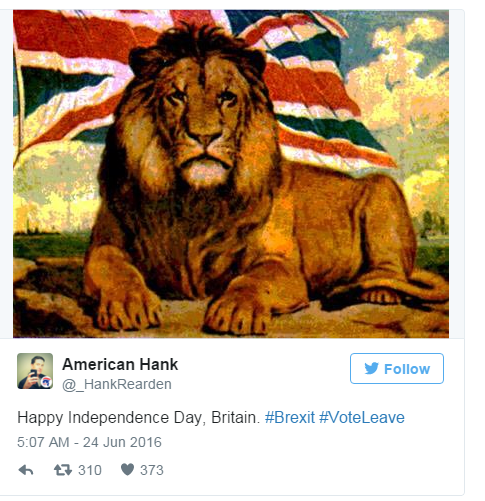
For many supporters of the victorious Leave campaign, 23 June was quickly dubbed the UK's 'Independence Day' online - although others took issue with the phrase.
Inspired by Boris Johnson and Nigel Farage, who called for an annual bank holiday to commemorate the vote, more than 65,000 tweets included the phrase in the hours after the polls closed. The main sentiment under the hashtag #IndependenceDay? Jubilation.
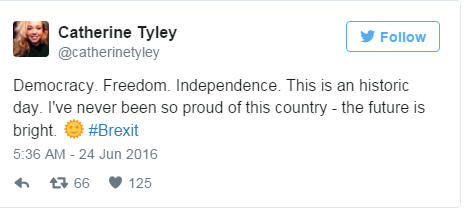
A number of the most popular tweets actually came from the United States, where many conservative activists also cheered the result.
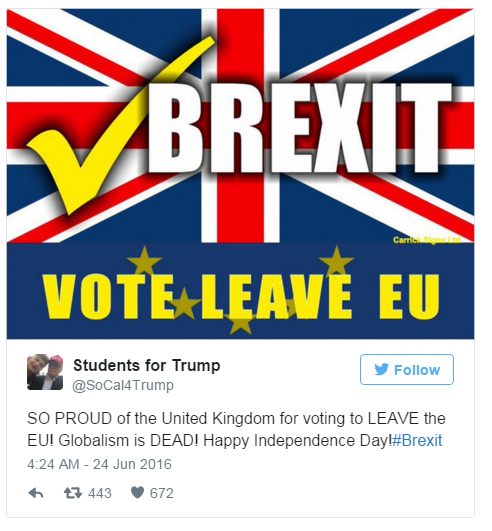
Chatter under the hashtag was not universally positive however, as critics of the Leave movement also voiced their views. Many scoffed at the idea of the EU as a colonial power. "I'm astounded by the insensitivity of people calling this our 'Independence Day', we were not colonised by the EU," tweeted one., external
The Hollywood film "Independence Day 2: Resurgence" is also just out, which wasn't lost on people.
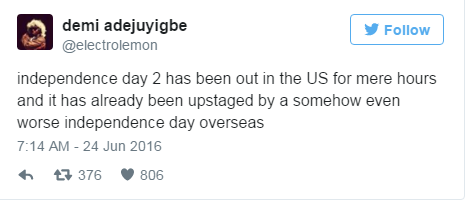
3. 'What have we done' - teenage anger
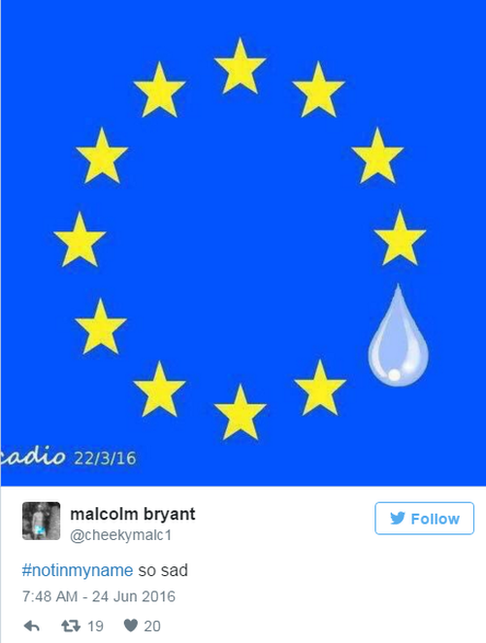
As the result of the EU referendum became clear, the poll's divisive effects across generational lines became highly visible online.
Some of the most visceral reaction to the Leave vote came under two related hashtags: "Not in my name" and "What have we done" shot into Twitter's top trends list on Friday morning and were used more than 20,000 times combined.
Twitter does not reflect the general population's view. The social network's demographic skews much younger than the UK's population, external as a whole. Pre-vote polls indicated that young people were more likely to vote Remain, external and thus many commenters using the hashtags were decrying the result.
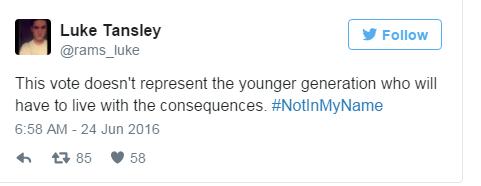
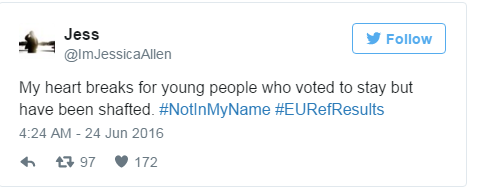

What does the term Brexit mean?
It is a word that has become used as a shorthand way of saying the UK leaving the EU - merging the words Britain and exit to get Brexit, in a same way as a Greek exit from the EU was dubbed Grexit in the past.

The hashtags were dominated by Remain supporters, although some pro-Leave voters also waded into the debate:
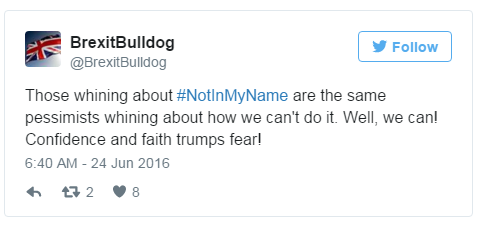
Other than anger, a common theme was frustration among 16 and 17-year-olds, who were not allowed to vote in the poll. Last year an initiative backed by Labour, the Lib Dems and SNP proposed lowering the voting age. However the government rejected the idea on the grounds of cost and it was voted down.
"I love waking up to be completely terrified about something that's going to affect me yet i had no say in it," mused one teenager.
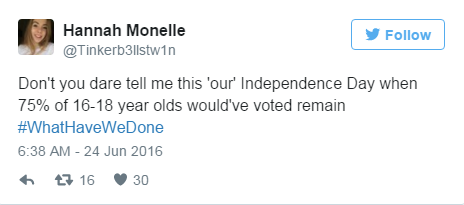
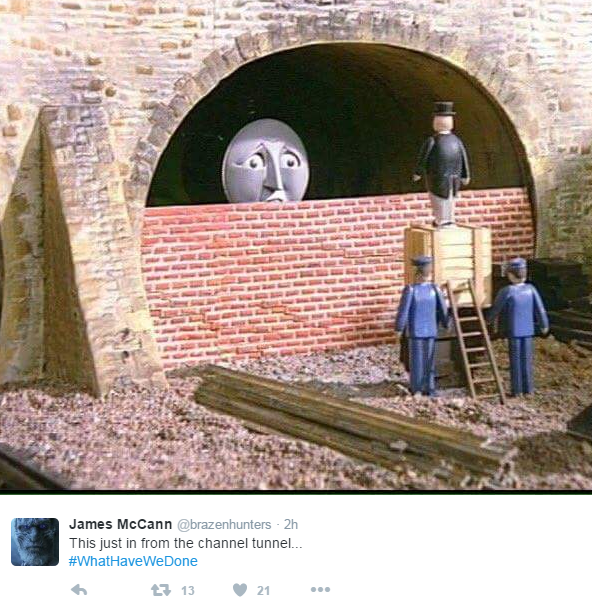
4. Scotland: 'Indyref 2' being pushed online
As the EU referendum count turned decisively towards Leave, the online conversation in Scotland immediately turned to the possibility of another vote on independence.
The idea has been long been dubbed "indyref 2" and that hashtag shot to the top of Twitter's trends list shortly after the vote result became clear. Scotland voted 62% in favour of Remain.
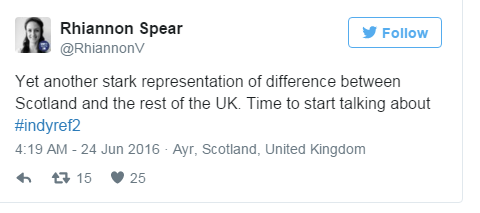
The conversation online was being driven overwhelmingly by pro-independence campaigners. But people who had supported "Better Together" during the Scottish referendum vote also spoke about the possibility of a break-away from the UK as a result of the vote over EU membership. Perhaps the most significant was Scottish author JK Rowling who tweeted, external: "Scotland will seek independence now. Cameron's legacy will be breaking up two unions. Neither needed to happen."
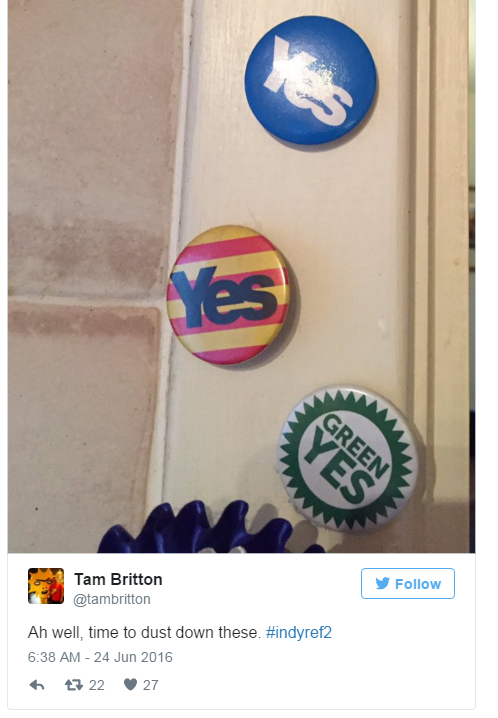
Many took to Twitter to express new or strengthened pro-independence feelings in the wake of the latest vote (Just as a reminder: a "Yes" vote in Scotland's 2014 referendum was for independence, while the winning "No" campaign backed staying in the UK).
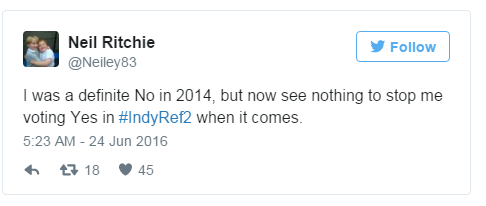
One old tweet from 2014's independence referendum gained new life on Friday. Put out by the cross-party Better Together campaign, it reminded Scottish voters that the EU membership of an independent Scotland would be no sure thing:
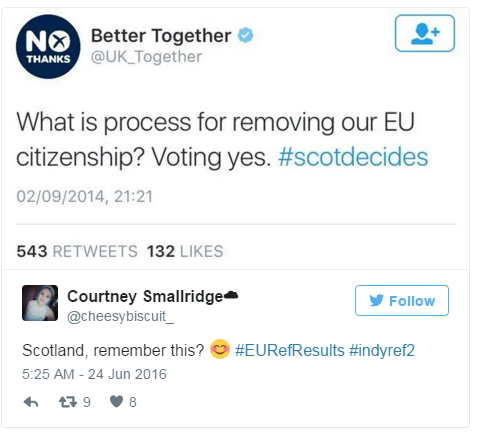
5. 'It's a new dawn, it's a new day'
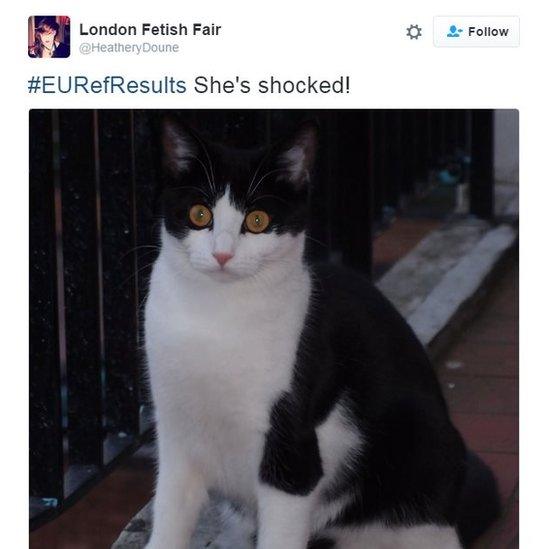
Who would have thought that a political vote would get so much attention on social media. The EU referendum certainly did. From the moment the polls closed at 22:00 BST on Thursday many took to Twitter to share their views.
The hashtags #EUref and #EURefResults were being used throughout the night as the votes were announced.
By the time the Leave result had been called in the early hours of Friday morning the hashtags had generated more than a million tweets.
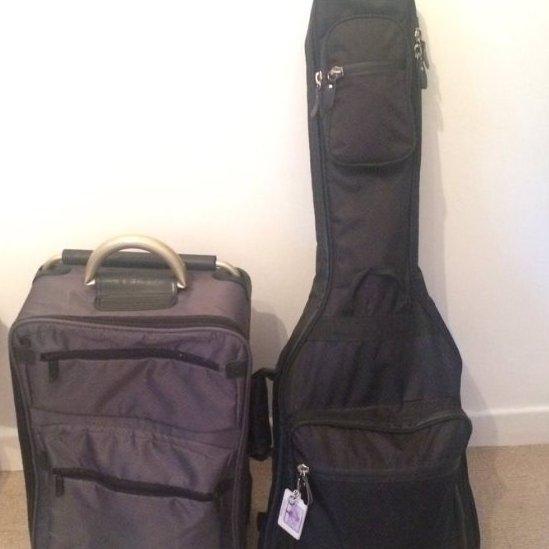
Alex Cooper, 20, a musician from Hayling Island, Hampshire, tweeted a picture of his guitar and suitcase with the words "I'm off to live elsewhere."
He says he is very shocked by the result of the referendum.
"I'm not actually leaving but as a guitarist I do feel it will make touring very difficult in Europe now that's for sure.
"I do dream of living abroad though, maybe that's what I will do one day, I'm thinking France."
Others also tweeted their fears for the future. There were concerns about the value of sterling after the results triggered a significant drop in the value of the pound.
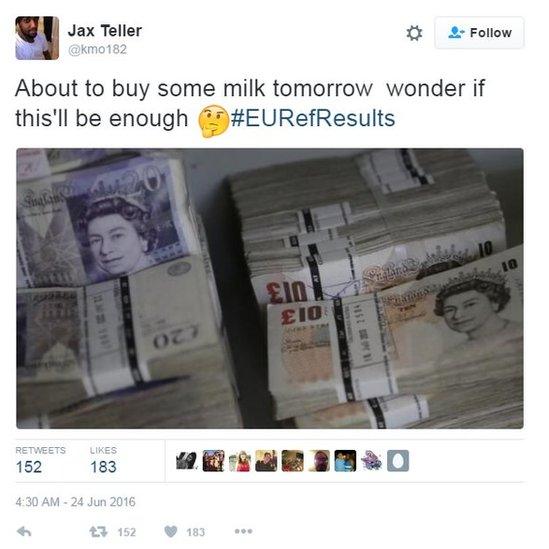
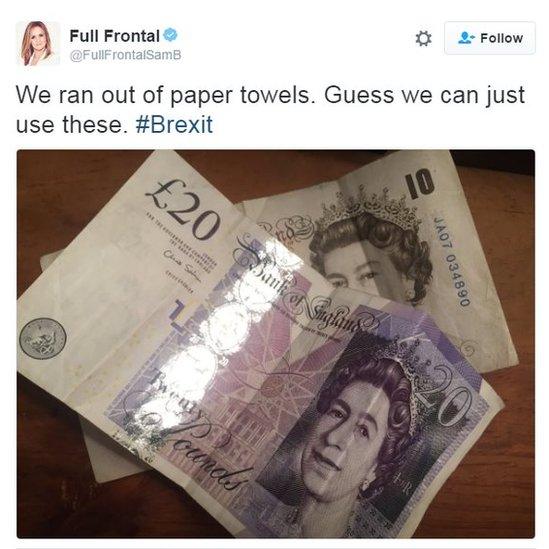
Read more: What will happen next?
But many people were thrilled with the result and optimistic about the future.
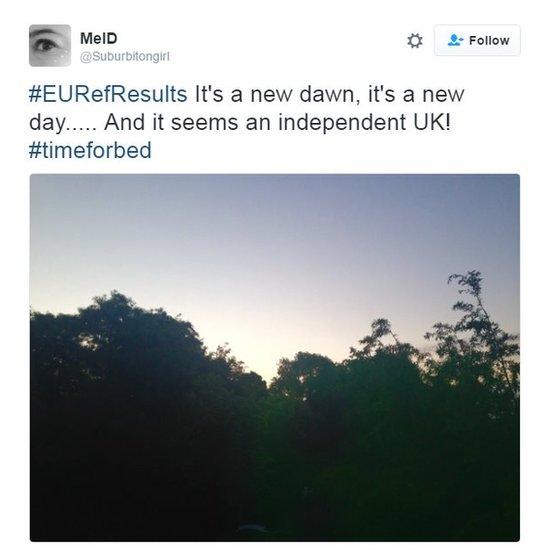
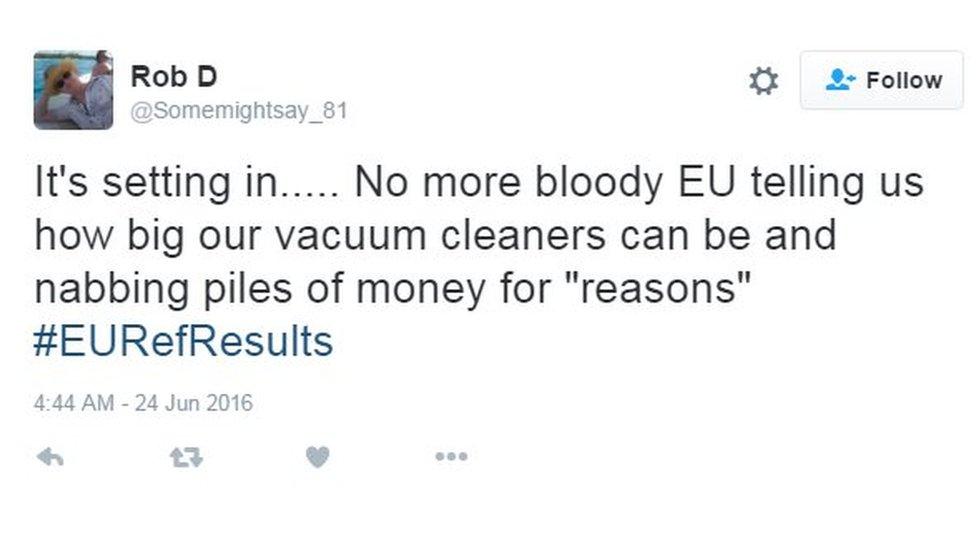
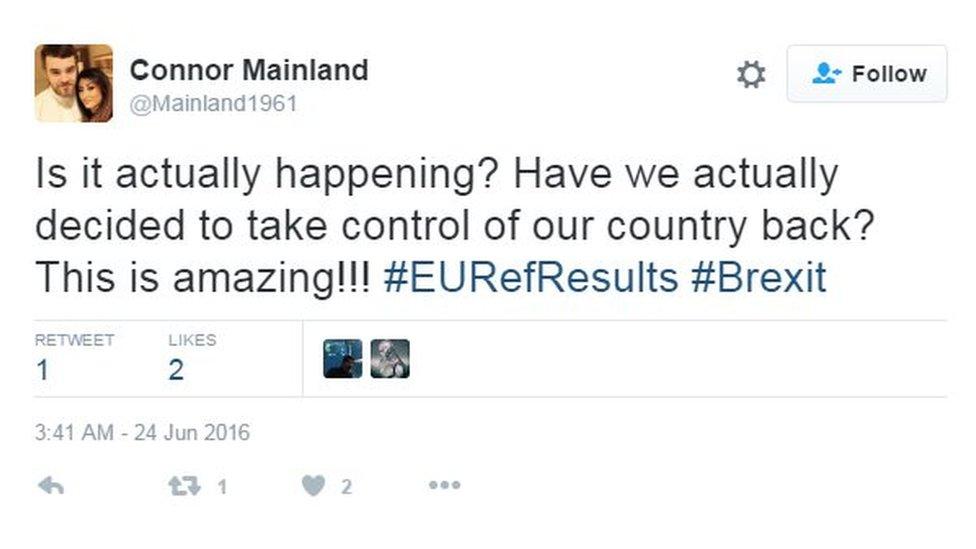
- Published19 June 2016
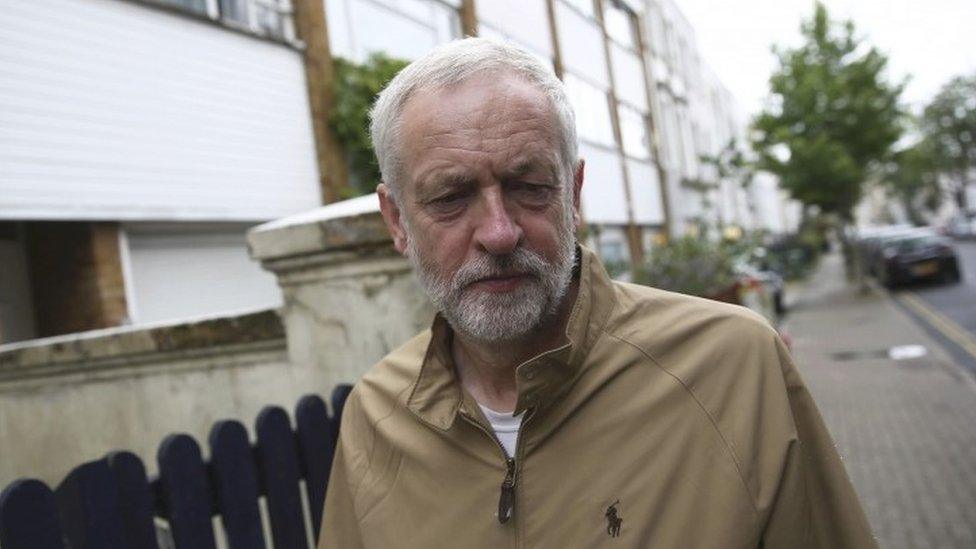
- Published24 June 2016
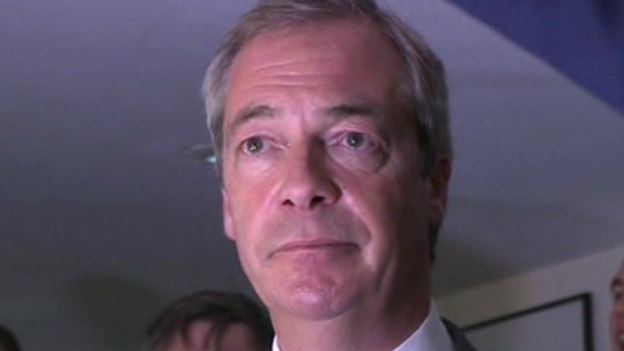
- Published24 June 2016
